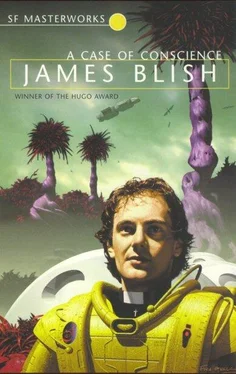The voice of the Great Nothing, pouring forth lies to the last.
Ruiz-Sanchez raised his hand. His shaken voice resounded and echoed in the cave of the observatory.
“I, A PRIEST OF CHRIST, DO COMMAND YE, MOST FOUL SPIRITS WHO DO STIR UP THESE CLOUDS—”
“What? For heaven’s sake, be quiet,” the UN man said irritably. Everyone else was staring in wonder, and in Liu’s glance there appeared to be a little fear. Only the count’s glance was knowing and solemn.
“—THAT YE DEPART FROM THEM, AND DISPERSE YOURSELVES INTO WILD AND UNTILLED PLACES, THAT YE MAY BE NO LONGER ABLE TO HARM MEN OR ANIMALS OR FRUITS OR HERBS, OR WHATSOEVER IS DESIGNED FOR HUMAN USE:
“AND THOU GREAT NOTHING, THOU LUSTFUL AND STUPID ONE, SCROFA STERCORATE, THOU SOOTY SPIRIT FROM TARTARUS, I CAST THEE DOWN, O PORCARIE PEDICOSE, INTO THE INFERNAL KITCHEN:
“BY THE APOCALYPSE OF JESUS CHRIST, WHICH GOD HATH GIVEN TO MAKE KNOWN UNTO HIS SERVANTS THOSE THINGS WHICH ARE SHORTLY TO BE; AND HATH SIGNIFIED, SENDING BY HIS ANGEL; I EXORCISE THEE, ANGEL OF PERVERSITY:
“BY THE SEVEN GOLD CANDLESTICKS, AND BY ONE LIKE UNTO THE SON OF MAN, STANDING IN THE MIDST OF THE CANDLESTICKS; BY HIS VOICE, AS THE VOICE OF MANY WATERS; BY HIS WORDS, ‘I AM LIVING, WHO WAS DEAD; AND BEHOLD, I LIVE FOREVER AND EVER; AND I HAVE THE KEYS OF DEATH AND OF HELL;’ I SAY UNTO YOU, ANGEL OF PERDITION: DEPART, DEPART, DEPART!”
The echoes rang and dwindled. The lunar silence flowed back, underlined by the breathing of the people in the observatory and the sound of pumps laboring somewhere beneath.
And slowly, and without a sound, the cloudy planet on the screen turned white all over. The clouds and the dim oceans and continents blended into a blue-white glare which shone out from the screen like a searchlight. It seemed to penetrate their bloodless faces down to the bone.
Slowly, slowly, it all melted away: the chirruping forests, Chtexa’s porcelain house, the barking lungfish, the stump of the Message Tree, the wild allosaurs, the single silver moon, the great beating heart of Blood Lake, the city of the potters, the flying squid, the Lithian crocodile and his winding track, the tall noble reasoning creatures and the mystery and the beauty around them. Suddenly the whole of Lithia began to swell, like a balloon—
The count tried to turn the screen off, but he was too late. Before he could touch the black box, the whole circuit went out with a puffing of fuses. The intolerable light vanished instantly; the screen went black, and the universe with it. They sat blinded and stunned.
“An error in Equation Sixteen,” the count’s voice said harshly in the swimming darkness.
No, Ruiz-Sanchez thought, no. An instance of fulfilled desire. He had wanted to use Lithia to defend the faith, and he had been given that. Cleaver had wanted to turn it into a fusion-bomb plant, and he had got that in full measure, all at once. Michelis had seen in it a prophecy of infallible human love, and had been stretched on that rack ever since. And Agronski—Agronski had wanted nothing to change, and now was unchangeably nothing.
In the darkness, there was a long, ragged sigh. For a moment, Ruiz-Sanchez could not place the voice; he thought it was Liu. But no. It was Mike.
“When we have our eyesight back,” the count’s voice said, “I propose that we suit up and go outside. We have a nova to watch for.”
That was only a maneuver, an act of misdirection on the count’s part—an act of kindness. He knew well enough that that nova would not be visible to the naked eye until the next Holy Year, fifty years to come; and he knew that they knew.
Nevertheless, when Father Ramon Ruiz-Sanchez, sometime Clerk Regular in the Society of Jesus, could see again, they had left him alone with his God and his grief.
The Planet Lithia (from Michelis, D., and Ruiz-Sanchez, R.: Lithia—a preliminary report. J. I. R. 4:225, 2050; abstract.) Lithia is the second planet of the solar type star Alpha Arietis, which is located in the constellation Aries and is approximately 50 light-years from Sol. [1] An earlier figure of 40 light-years, often quoted in the literature, arose from application of the so-called Cosmological Constant. Einstein’s reluctance to allow this “constant” into his scholium has now been fully justified, v. Haertel, J. I. R. 1:21, 2047
It revolves around its primary at a mean distance of 108,600,000 miles, with a year of approximately 380 terrestrial days. The orbit is definitely elliptical, with an eccentricity of 0.51, so that the long axis of the ellipse is approximately 15 per cent longer than the short axis.
The axis of the planet is essentially perpendicular to the orbit, and the planet rotates on its axis with a day of about 20 terrestrial, hours. Hence, the Lithian year consists of 456 Lithian days. The eccentricity of the orbit produces mild seasons, with long, relatively cold winters, and short, hot summers.
The planet has one moon with a diameter of 1,256 miles, which revolves about its primary at a distance of 326,000 miles, twelve times in the Lithian year.
The outer planets of the system have not yet been explored. Lithia is 8,267 miles in diameter, and has a surface gravity of 0.82 that of Earth. The light gravity of the planet is accounted for by the relatively low density, which in turn is the result of its composition. When the planet was formed there was a much lower percentage of the heavy elements with atomic numbers above 20 included in its make-up than was the case with the Earth. Furthermore, the odd-numbered elements are even rarer than they are on Earth; the only odd-numbered elements that appear in any quantity are hydrogen, nitrogen, sodium and chlorine. Potassium is quite rare, and the heavy odd-numbered elements (gold, silver, copper) appear only in microscopic quantities and never in the elemental form. In fact, the only uncombined metal that has ever appeared on the planet has been the nickel-iron of an occasional meteorite. The metallic core of the planet is considerably smaller than that of the Earth, and the basaltic inner coating correspondingly thicker. The continents are built, as on Earth, basically of granite, overlaid with sedimentary deposits.
The scarcity of potassium has led to an extremely static geology. The natural radioactivity of K40 is the major source of the internal heat of the Earth, and Lithia has less than a tenth of the K40 content of the Earth. As a result, the interior of the planet is much cooler, vulcanism is extremely rare, and geological revolutions even rarer. The planet seems to have settled down early in life, and nothing very startling has happened since. The major part of its uneventful geological history is at best conjectural, because the scarcity of radioactive elements has led to great difficulties in dating the strata.
The atmosphere is somewhat similar to that of the Earth.[2] The atmospheric pressure is 815.3 mm at sea level, and the composition of dry air is as follows:
Nitrogen 66.26 per cent by volume
Oxygen 31.27
Argon 2.16
CO 2 0.31
The relatively high CO 2concentration (partial pressure about 11 times that of the gas in the Earth’s atmosphere) leads to a hothouse type of climate, with relatively slight temperature differences from pole to equator. The average summer temperature at the pole is about 30°C., at the equator near 38°C., while the winter temperatures are about 15° colder. The humidity is generally high and there is a lot of haze; gentle, drizzling rain is chronic. There has been little change in the climate of the planet for about 700 million years.
Since there is little vulcanism, the CO 2content of the air does not rise appreciably from that cause, and the amount consumed in photosynthesis by the lush vegetation is compensated for by the rapid oxidation of dead vegetable matter induced by the high temperature, high humidity, and high oxygen content of the air. In fact, the climate of the planet has been in equilibrium for more than half a billion years. As has the geography of the planet. There are three continents, of which the largest is the southern continent, extending roughly from latitude 15° south to 60° south, and two-thirds of the way around the planet. The two northern continents are squarish in shape, and of sizes similar to each other. They extend from about 10° south to about 70° north, and each one about 80° east and west. One is located north of the eastern end of the southern continent, the other north of the western end. On the other side of the world there is an archipelago of large islands, the size of England and Ireland, running from 20° north to 10° south of the equator. There are thus five seas or oceans: the two polar seas; the equatorial sea separating the southern from the northern continents; the central sea between the two latter, and connecting the equatorial sea with the north polar sea; and the great sea, stretching from pole to pole, broken only by the archipelago, extending a third of the way around the planet.
Читать дальше











